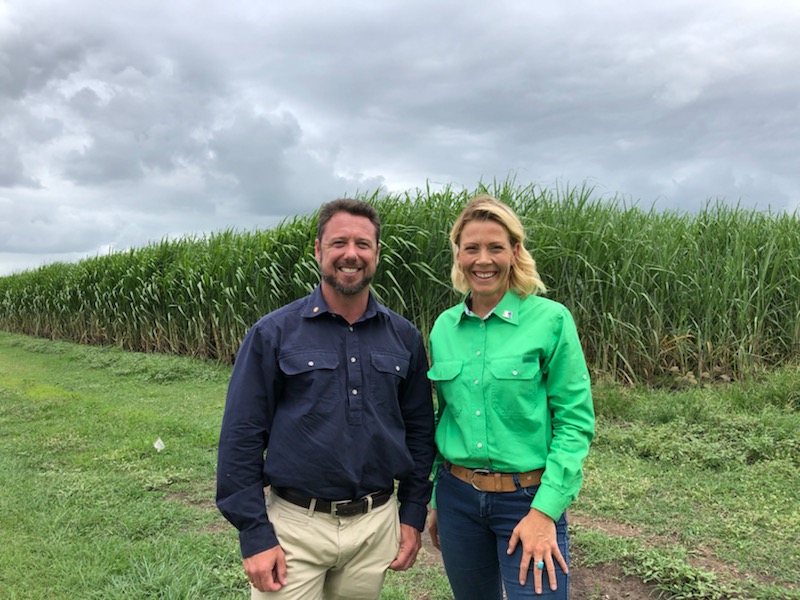Ethanol solution to boosting fuel reserves

Hinchinbrook MP Nick Dametto and Queensland Renewable Fuels Association managing director Larissa Rose.
REGULATING the use of ethanol blended fuels would improve Australia’s frightening lack of fuel security, Hinchinbrook MP Nick Dametto says.
Mr Dametto said recent media reports that Australia only had 22 days of petrol and 17 days of diesel in reserve domestically to rely on in the event of an international crisis was unacceptable.
“Given the current global instability, that is a dangerously low amount of fuel and the Federal Coalition Government needs to be held to account for presiding over this grave situation,” he said.
“Most governments around the world own a significant amount of fuel reserves on home soil in case of a crisis. Our Federal and State governments own the fuel in government cars and that’s about it.
“If they are serious about boosting our reserves, then our Federal and State governments should join forces and look for ways to boost domestic fuel production. A tangible way to achieve this could be by legislating a phase out of regular unleaded fuel and replacing it with 10 per cent ethanol blended fuel (E10), similar to what happened when we replaced leaded with unleaded fuel.
“A decision like this would ignite our national biofuels industry and help to put our nation’s fuel reserves back on track. Regions like the Hebert River District and Burdekin would be prime locations for such refineries. An abundance of feed stock (sugar cane) and a major port located close by is the key to success for this emerging industry. When it comes to biofuel use and production, we are falling well behind the rest of the world.”
In the last Queensland Parliament, Katter’s Australian Party (KAP) was able to achieve a non-binding target mandate requiring four per cent of the total volume of regular unleaded petrol sales and ethanol-blended fuel sales by liable retailers to be ethanol-based fuel.
That mandate took effect on July 1 and take up currently sits at 2.7 per cent. The KAP is calling for a 10 per cent mandate by 2025.
In a Question Without Notice put to Energy Minister Dr Anthony Lynham in parliament last November, Mr Dametto asked, with the falling world sugar price and farmers looking to value add products like ethanol, whether the government was committed to enforcing the four per cent ethanol mandate and would consider phasing out low-quality, regular unleaded petrol for E10 across the state.
In his response, Dr Lynham agreed that the sugar industry needed to diversify but rejected there was a need for re-regulation to enforce the existing four per cent ethanol mandate. Dr Lynham added that 650 service stations in Queensland now sell E10, an increase of over 290 sites since 2016.
In a previous statement made in May last year, Dr Lynham said the government wanted “80,000 passenger vehicles to swap to E10 to get to our four per cent target”.
Using E10 reduces tail pipe emissions by 30 per cent and Mr Dametto said more needed to be done.
“I am in disbelief over the government’s position on biofuels. One the one hand, their language is supportive and encouraging and on the other they shy away from adding any solidarity to this clean, green industry,” he said.
“It’s just not enough to be seen to be playing around the edges. More has to be done. It was ok for both the Federal and State governments to incentivise and regulate to coax consumers to install solar panels on their roofs but now it’s time they address the major issue sitting right under our noses when it comes to particulate matter in our air, tail pipe emissions.
“According to the US Department of Energy, more than 98 per cent of gasoline (petrol) in that country contains ethanol, and is typically E10. The sky hasn’t fallen in there and there’s no reason why we couldn’t follow suit in Australia through regulation and rebates to ensure vehicles are brought up to specification to be E10 compatible if they aren’t already.”
Most modern vehicles today are equipped to handle E10 fuel and Queenslanders can use the government’s E10 OK website to check if their car is compatible simply by inputting their rego numbers.
Queensland Renewable Fuels Association managing director Larissa Rose said biofuels provided the “most significant pathway” for Australia to reduce its dependency on the importation of fossil fuels.
“If we have a 10 per cent national ethanol blending mandate in petroleum, we can alone look at reducing about 18 per cent of our automotive petroleum imports,” she said.
“At a Federal level, this fuel shortage has been going on for some time. There’s been many warning signs. We have a 100 year agricultural industry that can already supply the feedstocks to be able to produce these biofuels. It’s waiting there eagerly for this to be the pathway to ensure greater fuel security for this country.”
Ms Rose said there needed to be a “triple bottom line” approach at a Federal level to have biofuels eventually displace part of our fossil fuels.
“What that means is ensuring there are mechanisms and policies in place that dictate the amount of fuel choice and quality of fuel we have to displace our dependency on fossil fuels,” she said.
“The solution to fuel security in this country is biofuels and why would we not be leveraging off that?”





